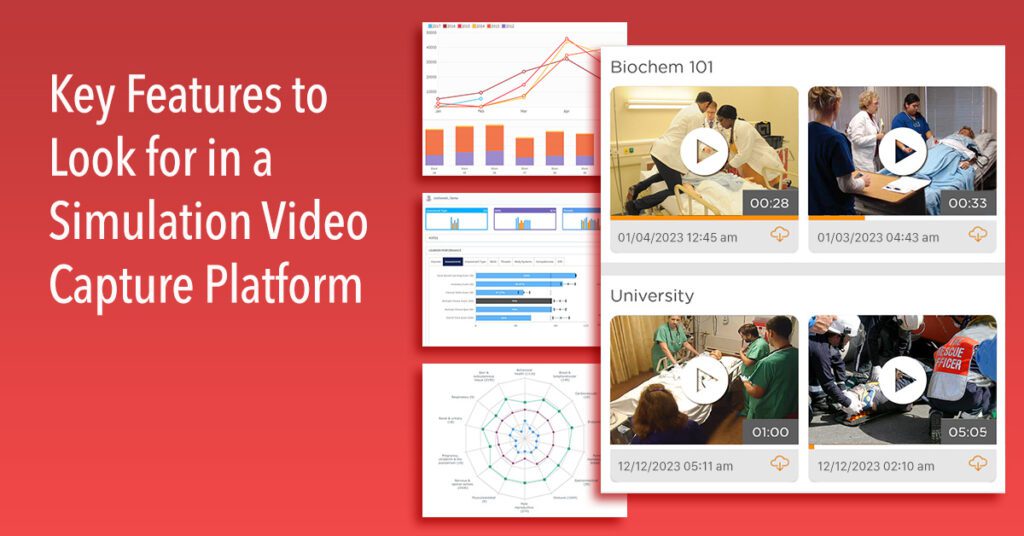In recent years, simulation audio video capture system have become essential tools in simulation-based training across various fields, particularly in healthcare. The growing importance of these platforms stems from their ability to enhance learning experiences, provide valuable feedback, and facilitate skill development in a controlled yet realistic environment.
When it comes to choosing a simulation A/V systems, several key factors should be considered to ensure optimal effectiveness and usability. These factors encompass the platform’s technical capabilities, compatibility with existing systems, ease of use, and support for learning objectives. By carefully evaluating these aspects, educators and trainers can make informed decisions that align with their specific needs and goals.
In this blog, we will explore the essential elements and considerations that educators and healthcare training professionals should keep in mind when selecting a simulation av recording debriefing systems. From high-quality video recording to seamless integration with learning management systems, we will discuss the features and functionalities that contribute to a successful simulation-based learning environment.
Importance of Simulation Audio Video Recording System in Healthcare Training
- Enhanced Learning Outcomes: Realistic simulations allow learners to practice clinical procedures, communication, and critical thinking. Audio-Video system solutions for simulation enables educators to assess performance objectively, identify areas for improvement, and provide targeted feedback.
- Safe and Controlled Environment: Simulation recording system create a secure space for learners to learn from mistakes, build confidence, and improve skills. Video capture ensures that these experiences are recorded for reflection and growth.
- Interprofessional Collaboration: In healthcare, teamwork is crucial, simulation videos enable learners from different disciplines to collaborate, enhancing communication and patient care outcomes.
- Evidence-Based Practice: Video evidence supports competency assessment and validates skill acquisition. It aligns with evidence-based practice principles, ensuring that learners meet industry standards.
Key Considerations When Choosing a Simulation Video Capture Platform
Automatic Video Recording and Upload
Educators should focus on their students, not the technology they use to reach them. Your video capture software for simulation needs to effortlessly record and upload simulation sessions, requiring minimal input from instructors. It should seamlessly sync with the appropriate curricula, working in tandem with your LMS for a smooth educational experience.
Easy-to-use Bookmarking and Annotation Features
Allowing educators and learners to mark specific points of interest or relevance within simulations facilitates easier navigation and review of key moments during debriefing sessions. These features enable educators to annotate specific areas of interest or note important observations, contributing to an interactive and immersive learning experience. This capability not only facilitates reflection and self-assessment but also promotes collaboration and communication among learners and educators during the debriefing process.
Full-Featured Automated Recording Capabilities
An advanced automated simulation recording debriefing systems should offer exceptional usability, enabling users to generate on-demand videos and course materials that seamlessly integrate with relevant course content. Educators should have the flexibility to utilize any integrated device for recording in A/V-equipped classrooms, creating an immersive 360° learning experience that fosters engagement and optimizes knowledge retention among students.
Universal LMS Integration
Full Learning Management System (LMS) integration with any major system via LTI compatibility is essential. This cross-compatibility enables faculty and students to seamlessly access courses and assets with single sign-on capabilities and sync assessment data back to corresponding LMS grade books. With effective integration and course management technology, an institution’s educational experience becomes increasingly flexible and expands learning environments beyond the simulation classroom.
Advanced Live Streaming Capabilities
Innovative video streaming and live video conferencing features can keep your learners connected and engaged with curriculum in new ways, allowing educators to shift the simulation classroom to the cloud with easy-to-use online video software. The ability to broadcast guest speakers and live events keeps learners involved with HD-quality video and interactive content, and expands the curriculum beyond traditional simulation.
Comprehensive Video Management
In addition to your enterprise video management platform having the ability to record, edit, and organize course-specific media content, you also need to easily store and instantaneously retrieve those video assets. An archival system that allows you to tag, search, playback, bookmark, edit, and annotate media content is central to getting buy-in from users.
Easy-to-Access Analytics
The best simulation video capture platforms give educators the tools they need to review and assess how much their platform is utilized. Evaluating usage and cost allocation with advanced custom analytics inside the video capture program platform makes curriculum review and accreditation reporting much easier.
Meaningful Assessment Tools
Effective audio video management platforms should integrate interactive quizzes linked to content chapters and bookmarks seamlessly. They should also automatically track and integrate performance scores with other LMS assessment systems. These simulation management solutions enable educators to gain valuable insights into learner engagement and performance, extending beyond simulation scenarios.
To cater to a diverse student population and enhance engagement, educators must explore and leverage innovative technology platforms. Simulation Recording Debriefing Systems (both hardware and software), with their ability to transcend educational and geographic barriers, can broaden the reach of healthcare simulation-based training programs and significantly improve educational outcomes for students.
#HCSIMWEEK23 #HCSIMWEEK #healthcaresimulation #simulation #healthcareeducation

